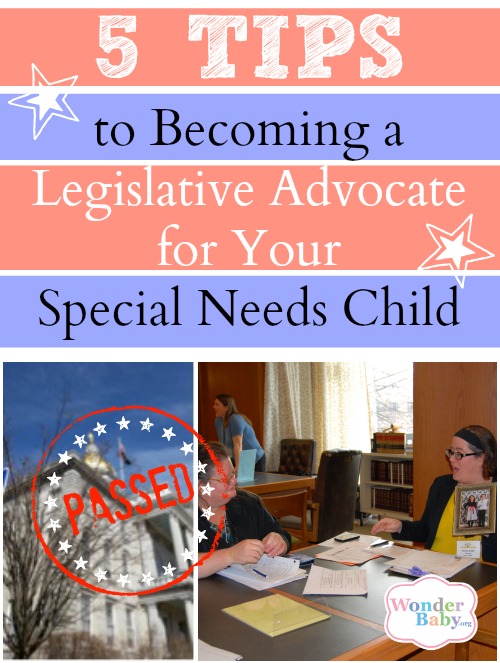5 Tips to Becoming a Legislative Advocate for Your Special Needs Child

We all have a voice and we deserve to be heard. It’s scary to reach out to legislators and other people in government, but sometimes it becomes a necessity.
When you have a child who is blind or visually impaired (or experiences any disability) many of your child’s valuable supports and resources are tied one way or another to legislation.
I am a resident of the state of New Hampshire. Every states does things a bit differently, but the basics are still the same. Many of these things can carry over to the federal level, but for now I am focusing on the state level.
A few months ago I knew very little about how our state government worked. Recently though I have started to become more involved. I have been calling and emailing my state representatives and governor. I have attended a few committee hearings and testified at two. Yes that means I spoke from the heart telling legislators why I supported two bills.
And you know what I have realized? I matter. My kids matter.
And I will not be quiet any longer.
Do you want to get more involved too? Here are five lessons I’ve learned along the way:
-
- Don’t think your opinions don’t matter.
This is something I feel is a common road block. I always thought there was someone “smarter” than me that would be a better voice. Always remember that no one can speak better for you than yourself. Don’t assume someone else will fill the void. You do matter. Once you have gotten past this, things do get easier. Remember legislators are YOUR employees. - Vote. And bring your kids with you to vote.
Voting is important for me. It should be important to you. I always make sure my children come with me too. I realize different state and localities have different laws, but I have always brought my kids with me when I vote. I think it’s important for my kids to see me vote and for them to know it’s important to me.Here is another tip: I was told anyone can use the accessible voting booths at our polling station and since then that is how I try to vote. The system is only going to get better with more people using it.
- Don’t think your opinions don’t matter.

- Learn the process and practice.
Start off at the basics and learn how a bill becomes a law in your state. When your legislature goes into session find a few bills to follow through the process. It will be invaluable to find out how you can check a bill’s status as it moves through. Some states make this easy (like New Hampshire). GovTrack is a service that allows you to track bills through the process of becoming law. They offer a State Search, so you can look up your state to follow local state legislation.If you can go to a public hearing go and watch just to see what happens. Where do you sit? Who do you talk to? How do you announce that you want to testify? Don’t be afraid to ask. Ask organizations you may already be involved with if they have a legislative liaison or committee and get involved.
- Get to know who represents you at the city, county, state and federal level.
And save this information. Look for opportunities to meet and even speak with your representatives. You don’t have to do this for any particular reason, just to have them slowly get to know you and so you feel more comfortable speaking to them. This is valuable so when the time comes and you NEED to speak with them on an issue or bill you will feel more comfortable doing so. Plus they may feel more open to what you have to say because they already know you a little and that little can mean a lot.When you communicate with them don’t be afraid to talk about your kids. You are building this relationship as a parent. Show pictures. When I have submitted written testimony for hearing I always include a picture of my kids. It may be easy to say no to you, but perhaps a little harder to say no to your child.
- Learn the value of your communication.
We have all seen it. Friends and organizations share a call to contact representatives on some level about a current bill. Really look at the bill and make sure you understand it and how you feel about it. Prepare a two or three line statement on why YOU support or are against a certain bill. Phone calls have a lot of weight so if you can make a call then do so. Be prepared with the bill number and use your statement to share your opinion on the bill.You will most likely be leaving a message, be it with a staff person or a recording. Make yourself clear. I would follow up any call with an email saying the same thing. Make it personal. Don’t send out big bulk emails to your representatives. Don’t just copy and paste someone else’s message, but use that information to write your own. If a bill becomes very important to you don’t get too upset at friends and family who don’t get all fired up like you. Just keep at it and keep asking. Some people will come around, but this is about YOU and your voice and always focus on letting those who need to know what you want them to know.

Related Posts

Advocacy, Special Needs
Advocacy Strategies for Parents of Special Needs Children
Learn about effective advocacy strategies for parents of special needs children and discover how to ensure the best possible outcomes for your child.

Advocacy
How to Work with Difficult Doctors & Therapists
As the parent of a disabled child you probably have to meet with quite a few doctors and therapists. What can you do if you just don't agree with their...

Advocacy, Parenting
Family vs Ableism: What I’ve Learned As a Mother of a Child with a Disability
Is it more important to be worried about how you're presenting yourself and your family to the outside world and the wider disability community, or to focus on the needs...